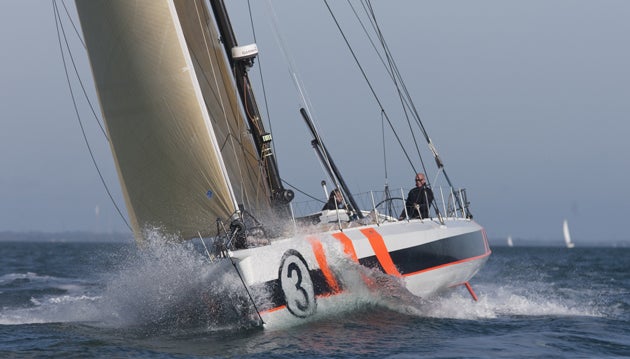Sailors predict flat out race to Costa Rica in the Transat Jacques Vabre

The wind whipping up the Channel and into the harbour of Le Havre today served notice to the 20 yachts in the Bassin Paul Vatine that, come Sunday when they set off on the 5,000-mile Transat Jacques Vabre to Costa Rica, that the price of a sunny South American finish will be an opening autumnal slap in the face.
For the four British double-handed crews among the 14 Open 60s, futures are at stake, reputations are on the line. There will be no room for error. The man who won the race two years ago, the current titleholder also in the Vendee Globe solo round the world, said bluntly: "This is a race where you put a heavy stone on the accelerator pedal and leave it there."
The Independent's Stuart Alexander talks to Dee Caffari and Brian Thompson:
He expects to be pushing his boat Foncia up to 95 per cent of capacity, compared with 60 to 80 when singlehanded in the Vendee Globe.
His win earlier this year took so much out of him that, at the moment, he says he cannot face going again. "Today I don't have the motivation to do it a third time," he says.
Sam Davies, partnered by Frenchman Sidney Gavignet, rivals turned collaborators Dee Caffari and Brian Thompson, a transitional Alex Thomson with Ross Daniel, and a sponsorless Mike Golding digging into his own funds to race with Spain's Javier Sanso form a string British presence on what remains a largely French patch.
This is Golding's sixth appearance in the coffee company sponsorship of one of the three big transatlantic races so beloved by the French - the other two are the Route du Rhum to Guadeloupe and the daddy of them all, the British-founded Transat, so far always out of Plymouth.
It is also one of the only two world class doublehanded races, the other being the Barcelona non-stop round the world. Where long-distance races require a more measured rhythm, all four of the British crews have emphasised the need to be quick out of the blocks in order to be up front when turning onto the mid-Atlantic belt of favourable trade winds.
Weather expert and racing router Mike Broughton says that the new route has changed the whole conduct of the race. Two years ago Golding had been in the lead for five days and then took a losing option crossing the Doldrums.
There are no Doldrums to cross on the new route; find yourself near the back after exiting the Channel, rounding Ushant and heading south and playing catch-up could be a forlorn game. "By the time you reach Madeira you need to be in the lead," say Broughton. "After that it will be all about downwind speed."
Expect, also, some of the crews to take early their only opportunity to play a 24-hour stealth card, which hides their route choice and progress from being transmitted to the rest of the fleet and the world.
If life is uncertain for three of the four British teams, Alex Thomson has a new deal in place which will see him doing the Barcelona race in the latest 60 to carry the Hugo Boss name, the former Pindar, designed by Juan Kouyoumdjian.
But, in a cycle which pivots around the Vendee Globe every four years and which finished in February this year, life is uncertain for many. Sam Davies must wait until early next year to see how Artemis plans to shape all of its yachting sponsorship, Dee Caffari's time with Aviva repeatedly comes to an end and is repeatedly extended, and Mike Golding is hoping for a new major sponsor for the Open 60 also to enter the Barcelona Race.
Thompson and Caffari both take the view that boatspeed will always be as important as brains and that making the fewest mistakes can avoid the "slippery slope" of trying to play catch up. Caffari is clearly more confident in her ability to control the boat after her 30,000 miles round the planet and "that looking after each other is really important. This race is huge and a good result would be awesome, I would really love it."
Thomson has put behind him a string of setbacks, including having his boat smashed just before the start of the last VG and then, after a massive repair effort to be on the start line, seeing other related problems forcing him out of the race.
"I have stopped saying 'why has this happened to me' and set myself up for the next one." On the same side of the dock, Mike Golding's former Ecover now has a new colour scheme, which he designed himself, has no sponsor name and he, too, had to overcome the bitter disappointment of being dismasted just after taking the lead in the VG.
"It's nice to be back in the swing of things," he said. "I have had to dig my hand into my own pocket in partnership with my long-time backer Philip Sorensen, but I hope it will be an investment. I need to prove the boat after the dismasting, the keel problems and all the other improvements we have done, so I need to stay in the arena. I just hope it isn't a swan song."
Golding at least has a second year of Extreme 40 sailing in 2010, when he will be 50. The same age as French legend Yves Parlier, though the wrinkle gods have been kinder to Golding. Parlier is at the helm of a Spanish yacht 1876, the year that its brewery backer Estrella Damm was founded.
He is something of an oracle, but his judgment is simple, not Delphic. "I think tactics will be the most important," he says.
Join our commenting forum
Join thought-provoking conversations, follow other Independent readers and see their replies
Comments
Bookmark popover
Removed from bookmarks